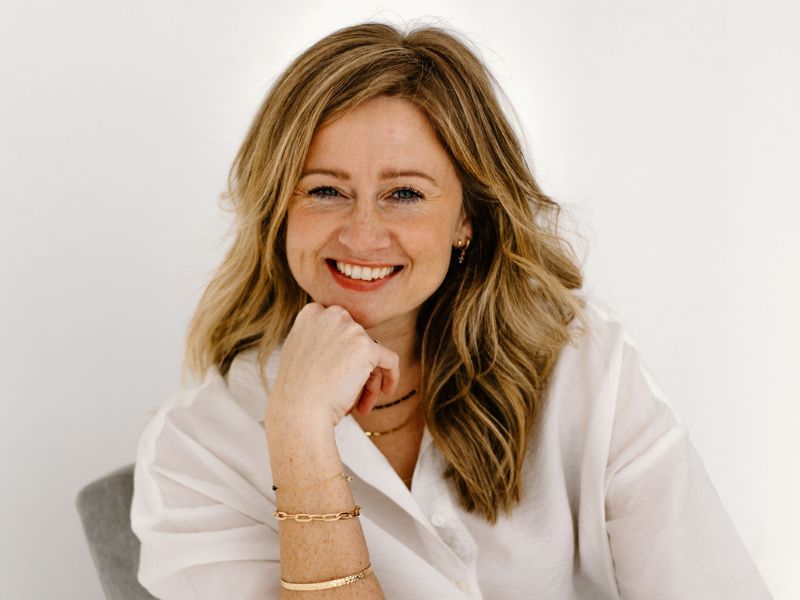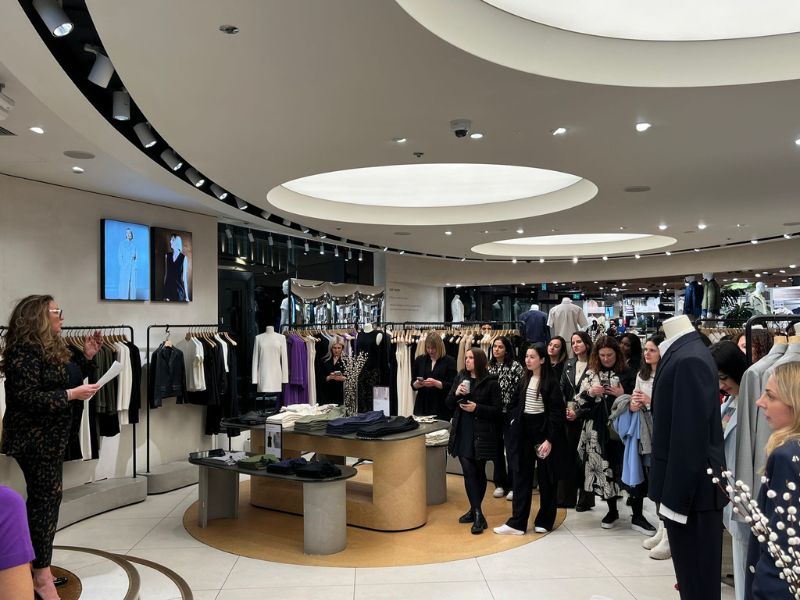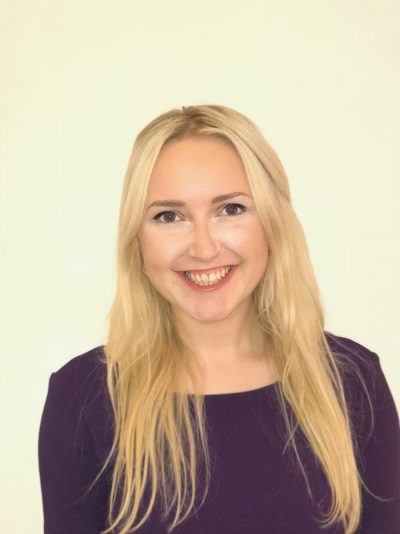 Rachel is the co-founder of luxury ethical womenswear brand, Careaux with her sister, Laura.
Rachel is the co-founder of luxury ethical womenswear brand, Careaux with her sister, Laura.
She has recently won Barclaycard Everywoman in Retail Innovator of the Year award, The EVAs Young Entrepreneur One to Watch and has been named on the Northern Power Women Future List 2019.
Tell us a bit about yourself, background and your current role
My name is Rachel Beattie, I am twenty-three years old and I am the co-founder of luxury ethical womenswear brand, Careaux with my sister and best friend, Laura. I graduated from The University of Manchester with a Masters in Mathematics, where I worked as a primary tutor for an educational charity. From an idea when I was fourteen I have combined my two loves of Maths and fashion to invent a new dress concept. As soon as I had this idea I could not wait to tell Laura, and from that moment Careaux was born.
Inspired by childhood memories of my Nana, the Careaux dress changes to fit each and every woman instead of women feeling they have to change themselves to fit into dresses. The dress has a hidden zip around the waist, which enables the dress to split into a top and a skirt. This means the dress can have a different or same size top to its bottom and interchange the tops and skirts to create different dress styles, fabric and colour combinations.
Careaux is proudly supported by The Princes Trust and I am also a STEM, Code First Girls and Pankhurst Centenary City Ambassador.
Did you ever sit down and plan your career?
As soon as I had the idea for Careaux ten years ago now, I knew that was what I wanted to do but I did not even know where to start. I was at school and Laura was at University, we had never run a business and did not know anyone who had ran a business before either. I took the route of A-Levels, degree and then a graduate job. But I always knew when I grew up I wanted to build Careaux and to create something that I could work on to create the change I wanted with Careaux. So I started thinking how was I going to get there and the steps I needed to take, it started from desk research to attending every event I could to learn more about how to start a business and hearing from people who had been there. Looking back now I think I would tell myself and my friends not to worry too much about sticking to your plan, as it is important to be agile and adapt as we have so many opportunities and so many careers that do not even exist yet. Also do not be afraid to do things differently, as sometimes we can follow the traditional route and do not want to move away from the plan but it is when we do things differently, creating change that you are passionate about that you find your dream career.
Have you faced any challenges along the way?
So many! I think the nature of setting up your own business comes with a new challenge or challenges every day. In particular, as I had never run a business before and the dress had never been done before. There were a lot of ‘no’s’ along the way and people saying the dress couldn’t be done or to just stick to making dresses how they are currently made in terms of sizing. But because I believed in the dress and not only what it could do by fitting to each and every one of us as individuals, our own shape, size and style but also what this represented, the diversity we encompass. I wanted to eradicate that feeling when you try clothing on and you feel terrible because you do not fit into it, where it is in fact the issue that the clothing does not fit to us, I wanted to create a dress and a brand that would never make anyone feel bad about themselves, in fact the complete opposite. Also, as an ethical brand in the early stages it can be really challenging to find the right suppliers. As an unknown brand asking difficult questions about health and safety, modern slavery, environmental regulations it is not always the best received. But I would not have it any other way as the more you ask, the closer you get to the perfect supplier and the more of us who ask the more power we have to bring about change and towards fashion for good. Our mindset has just been to stay true to our values and keep going.
As part of Careaux is the belief that no matter your background, your age, your shape, your anything, you can achieve what you want to achieve.
We have just kept going and stayed true to our values as we want to show that no matter what your background, your age, your show doesn’t matter what your background, remember that myself as well.
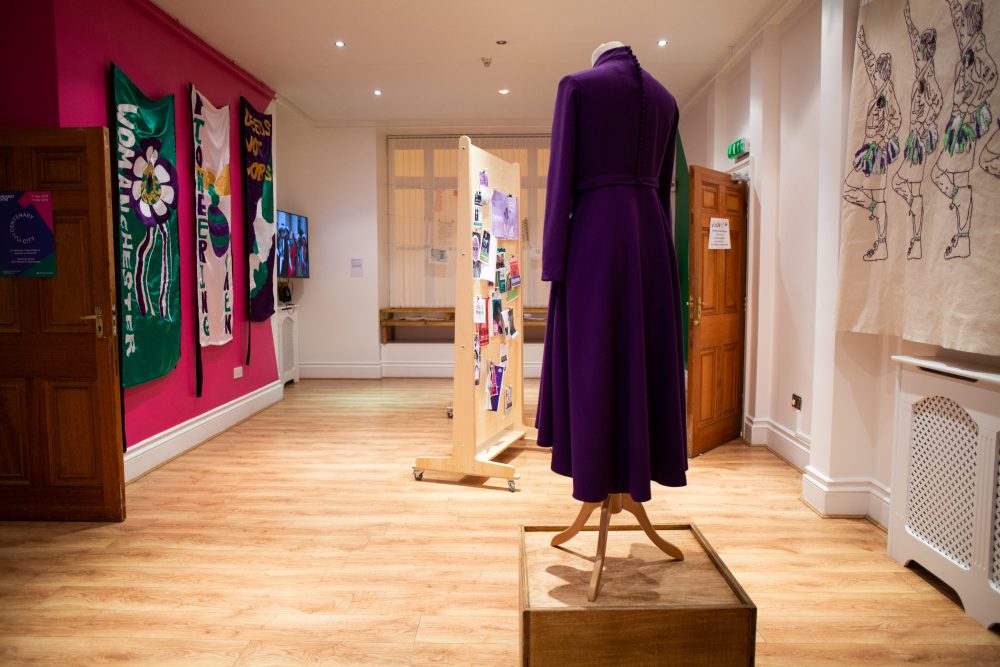
If you could change one thing for women in the workplace, what would it be?
It would be for us to have equality, but also inclusive equality. By this I mean, there may be 50 per cent women and 50 per cent men on boards or 50 per cent of women and 50 per cent of men in leadership roles or 50 per cent women and 50 per cent men treated equally in everything but I still think a lot of women feel like we still have to change ourselves to fit a certain mould, or dress a certain way or behave a different way in the workplace and in life. I would change for us to have inclusive equality, where we feel we can be exactly who we are and be valued equally for who we are. As it upsets me so much to think that we as women feel like we are not good enough or have to change to be valued. This is one of my main motivations for Careaux, this inherent belief that we should never have to change who we are to fit in, instead it should be celebrated and we should celebrate our diversity and our uniqueness.
How would you encourage more young women and girls into a career in STEM?
I went to an all-girls school and in that sense I was pretty naive about the gender gap in STEM subjects, as all of the girls did STEM subjects, therefore it was not until University that I learned properly about the lack of women in STEM and I just wanted to do whatever I could to change it.
As part of education now there are so many crossroads and so many decisions about what subjects to take and to carry on studying, these can be so scary as you feel like you are deciding your future for the rest of your life right there and then. At all my crossroads I would turn to my mum. My mum would always tell me I could do anything with Maths. This was combined with my school, where they instilled the belief that all of us girls could do Maths and STEM.
Therefore, I think the answer lies in how do we encourage more girls and women to believe they can do STEM. I am a strong believer in that anyone can do Maths/ STEM and you can do anything with Maths/ STEM. But I think if you replace the words ‘Maths/ STEM’ with any other subject the message is still the same, we need to encourage more women and girls to believe they can do anything.
Firstly, I think it is important to focus on everyone, not just on the young women and girls. As if we want to encourage and nurture this self belief, we need consistency from teachers, parents, guardians, peers and incredible relatable role models too showing that anyone can do STEM. This includes tackling the stereotypes that STEM subjects are too hard. What Maths has really taught me is that you do not have to be a genius you just need to work at it, keep going, fail fast and also keep trying different methods and you will get there in the end, which has been vital in my business. I think what has helped me is to talk about the skills we gain from Maths and STEM, for e.g. perseverance and problem solving as students often struggle to see the real life applications of STEM and why it is useful to them especially if they have already decided they want to pursue another subject.
Secondly, I think we need to show that every career is a career in STEM, to make STEM more accessible, as it is used every day in every situation. Once we show girls and young women that they are using STEM all the time anyway it starts to become more accessible. It is also really important to show the real life applications of STEM and how it is used to change the world and in everyday situations. For example, with Careaux as a STEM ambassador I do workshops showing how I have used Maths and fashion to invent a new dress. Some of the Maths I talk about is very early stage Maths for e.g. number of tops x number of skirts = number of dresses. But it is about showing them how the Maths they are learning is relevant to solving real world problems for women and the environment and also how Maths and STEM really is everywhere as a lot of people still believe you cannot be creative or be into fashion and be interested in Maths, which is another stereotype I am really passionate about eradicating.
Finally I think the issue of lack of women in STEM is not about getting more women and young girls to pursue STEM careers especially if they have other dreams, but it is about encouraging and doing everything we can to make sure they believe they can do STEM and pursue a career in STEM and that it is an option for them.
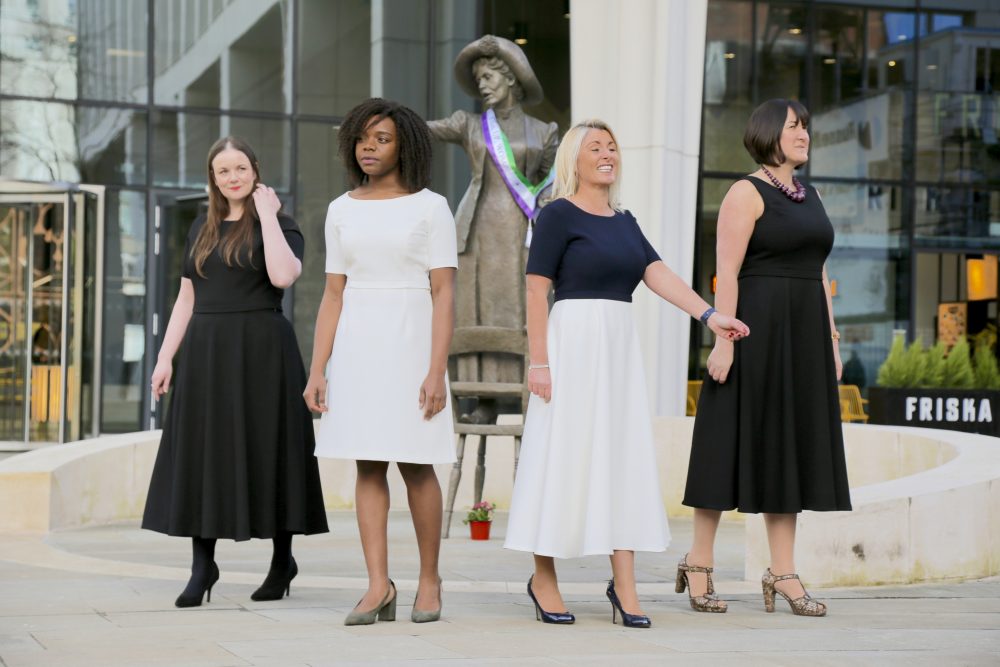
What has been your biggest achievement to date?
My biggest achievement has to be when I tried on the first ever Careaux dress prototype. It was the most amazing feeling after all those years of dreaming, testing and a lot of learning. Laura and I want to capture that feeling into every Careaux piece.
What is your next challenge and what are you hoping to achieve in the future?
We launched last month our limited edition core collection to pre-order on kickstarter until May 17th, we’ve been lucky enough to have incredible support so far and we just reached our goal, Laura and I are overwhelmed and are so grateful to every single person who has supported and shared. Therefore our main focus over the month is to continue the kickstarter and from this, we can start making the first collection and launch the e-commerce site later this year.
Thank you so much for taking the time to read this- we would love to hear from you on any feedback, ideas or styles you would like to see [email protected].





